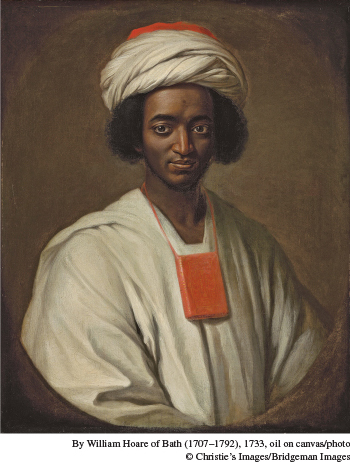ZOOMING IN: Ayuba Suleiman Diallo: To Slavery and Back
630

F ebruary 1730 found Ayuba Suleiman Diallo, less than thirty years of age, living between the Gambia and Senegal rivers in West Africa among the Fulbe-speaking people.38 Like his father, a prominent Islamic scholar and teacher, Ayuba was a Muslim who was literate in Arabic, a prayer leader in the local mosque, and a hafiz, someone who had memorized the entire Quran. He was also husband to two wives and father to four children. Now his father sent the young man on an errand. He was to take several of their many slaves to a location some 200 miles away, where an English trading ship had anchored, and exchange them for paper and other goods. The paper was especially important, for his father’s income depended on inscribing passages from the Quran on small slips of paper and selling them as protective charms.
To put it mildly, things did not go as planned. Unable to reach an agreement with the English merchant Captain Stephen Pike, Ayuba traveled farther south and traded his slaves for a number of cows in the land of the Mandinka people. Well beyond the safety of his own country, he was in dangerous territory. As he and his companions stopped to rest on the journey home, they were seized, their heads were shaved, and they were sold as slaves to the very same Captain Pike. Although Ayuba was able to send a message to his father asking to be ransomed in exchange for some of their slaves, the ship sailed before a reply was received. And so Ayuba, along with 168 other slaves, both men and women, headed for the British American colony of Maryland, where 150 of them arrived alive.
Sold to a local planter, Ayuba was immediately sent to the tobacco fields, but when he became ill from this heavy and unaccustomed work, his owner assigned him the less arduous and more familiar task of tending cattle. Alone with the cattle, Ayuba was able to withdraw into a nearby forest to pray, but he was spotted by a young white boy who mocked him and threw dirt in his face. Sometime later, no doubt in despair, Ayuba ran away, but he was soon captured and housed in the county jail, located in the back room of a tavern. There he became something of a local curiosity and attracted the attention of a lawyer named Thomas Bluett. When Ayuba refused wine, wrote a few lines in Arabic, and mentioned “Allah” and “Muhammad,” Bluett realized that he was “no common slave.” After locating an old slave who could translate for him, Bluett became fascinated by Ayuba’s story, and he initiated a process that took both of them to England in 1733, where philanthropists purchased Ayuba’s freedom.
Ayuba’s reception in England was amazing. Now fluent in English, Ayuba was received by the English royal family and various members of the nobility, hosted by leading scholars, and entertained by wealthy merchants, eager to tap his knowledge of economic conditions in West Africa. The prominent artist William Hoare painted his portrait, complete with a small Quran hanging from his neck.
In 1734, he finally set off for home, loaded with gifts from his English friends. There he encountered, quite by chance, the same Mandinka men who had sold him only a few years before. Francis Moore, a European trader accompanying Ayuba, wrote that he “fell into a most terrible passion and was for killing them” and was restrained from doing so only with difficulty. He arrived in his hometown to find that his father had recently died. His wives and children, however, were all alive and welcomed him warmly. One of his wives had remarried, believing him gone forever, but her new husband readily gave way, and Ayuba resumed his place of prominence in his own community until his death in 1773.
He also resumed his life as a slave owner. Selling some of the gifts he had acquired in England, he purchased a woman slave and two horses soon after his arrival back in West Africa. According to Moore, he “spoke always very handsomely of the English,” and he continued his association with the Royal African Company, the primary English trading firm in West Africa, in their rivalry with French traders.39 The last mention of Ayuba in the records of that company noted that he was seeking compensation for the loss of two slaves and a watch, probably the one given him in England by Queen Caroline.
Questions: What might you infer about Ayuba’s own view of slavery and the slave trade? What insights or questions about the slave trade does his remarkable story suggest?